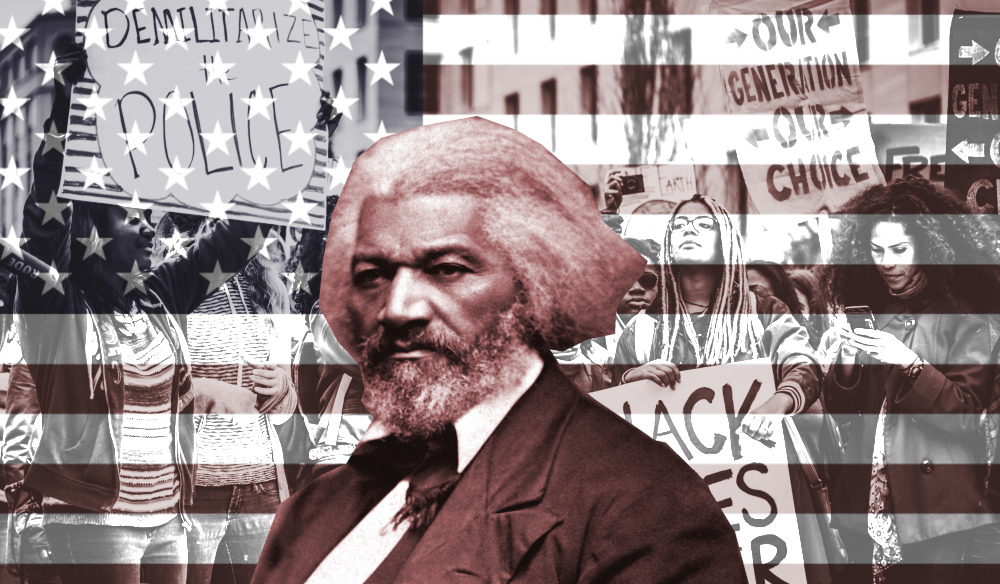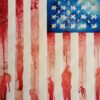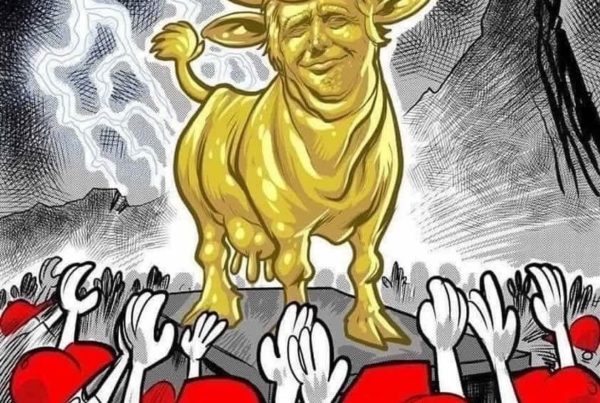For today’s What the F*rk Friday, it seems fitting to talk about July 4th, aka Independence Day, and in particular, to reflect on the things we’ve thus far cherished so deeply in this country yet are now finding out how problematic and racist they are.
There’s been a lot of discussion on monuments, statues, and team names being changed or removed, and along with these discussions, there are many who’re extremely upset and angry about it.
I can understand this. I grew up an extremely proud American, even more than some white folks, who in my opinion were extremely disrespectful of both the principles of this nation and our flag. I was someone who would reprimand people not taking their hats off at sporting events or placing their hands over their hearts when the national anthem was sung. There wasn’t an Olympic event I didn’t cry at when a US athlete won the gold. I bled red, white, and blue.
However, the last few years have been difficult because I’ve been learning and unpacking aspects of our history I was never taught. It’s not to say that I didn’t learn a great deal of the truth such as the genocide of indigenous first nation people or atrocities of slavery. Rather, it’s that this history was taught to me from a very white superior perspective – we had to kill the indigenous people because our lives were threatened by them, slavery was a necessary evil to ensure the success of what America is today, and on and on it went. The work of dismantling this education and seeing all sides of the story has been disorienting, to say the least. Yes, so much of the heritage I grew up and identified with – I was extremely proud of – is now continually being tainted with truths that are difficult to take in. I get the frustration. I’m not a foreigner who has a home country elsewhere – the United States is my home. I’m born and raised here and if I so desire, can run for president one day. I am an American through and through.
The truth of how white supremacy is in almost every aspect of our history is disheartening, and yet the suggestion to remove symbols that have represented the United States also feels threatening and offensive. Yes, we have some problems in our history but why do these symbols have to be removed, right?
But for those who haven’t yet fully processed or can’t understand what the big deal is, the question I want to challenge you with is why you would want anything that’s tainted with white supremacy to be a symbol of this country we love so dearly? If one truly believes that this country is a beacon of freedom, hope, and a better way of life, then wouldn’t we want items that symbolize this to be consistent with that belief?
But let’s tackle that question in a little bit.
I want to first dive more deeply into the process of lament and loss. There’s a professor who teaches on organizational leadership by the name of Ronald Heifetz, and a really impactful take away I got from his books was the idea that people aren’t resistant to change but rather loss.
Let me repeat that – people aren’t resisting change but loss.
Sit on that for a moment. Perhaps what we’re resisting isn’t actually the changes happening but rather, the loss – loss of history, identity, culture, and tradition.
I understand that there’s a great amount of loss and lament if we were to remove the monument at Mount Rushmore, change the name of a team you’ve been a devoted fan of since childhood, or delete songs that would no longer be sung even though they gave you great joy all throughout your life. It’s not only perfectly acceptable to mourn the removal of these symbols but more importantly, should be done because the process of mourning is one that’s healing and necessary in order to move forward in the healthiest way possible. We don’t want to deny anyone of this process. If anything, it’s crucial.
However, lamenting and mourning doesn’t mean we shouldn’t head towards a change for the greater good of everyone living in this country. So, I ask again, wouldn’t we want monuments and statues, symbols and names to represent the great things of this country, not the ones that remind us of the hatred, racism, and bigotry that’s been a part of our past? Would we not want to advance to a better future?
Now, you might be saying, how can these symbols, monuments, names, and songs not be for the greater good? How can anyone not have feelings of pride when seeing, cheering for, and singing these things?
Well let’s take a moment to read an excerpt from the great Frederick Douglass’ “What to the Slave is the 4th of July” speech about Independence Day:
What, to the American slave, is your 4th of July? I answer – a day that reveals to [them], more than all other days in the year, the gross injustice and cruelty to which [they] are the constant victim. To [them], your celebration is a sham; your boasted liberty, an unholy license; your national greatness, swelling vanity; your sounds of rejoicing are empty and heartless; your denunciations of tyrants, brass fronted impudence; your shouts of liberty and equality, hollow mockery; your prayers and hymns, your sermons and thanksgivings, with all your religious parade, and solemnity, are, to [them] mere bombast, fraud, deception, impiety, and hypocrisy – a thin wall to cover up crimes which would disgrace a nation of savages. There is not a nation on the earth guilty of practices, more shocking and bloody, than are the people of these United States, at this very hour.
**Watch this video of Frederick Douglass’s great-great-grandchildren reading his words here.
Perhaps these are harsh words to hear about something you’ve taken great pride in. Wouldn’t it be nice if we could just forget about everything and celebrate our holiday without thinking about the pain? Wouldn’t it would be great if we just sweep everything under the rug and not focus on the negative?
Here’s where the real challenge lies though, and where it’s imperative you let go of your grasp onto what is valuable to you and open your mind and heart to empathy towards others. I know this isn’t easy, but take a moment to breathe, unclench, and picture yourself releasing the resistance in your mind. I know we want to hold onto what we believe is right because it’s what we’ve known. Again, we’ve been told the lie that things such as slavery and genocide, although bad and unfortunate, were done for the greater good of our country. We believe this with the deepest of convictions. So it’s hard to change our minds about this. It’s difficult to deal with the loss when we can’t fully understand or believe the why that removing such things is actually better for us. Our resistance is understandable. In fact, it’s scientific. It’s been discovered by neuroscientists that our biases, our holding onto what we believe is right, is built into the very way our brains process information and we resist and refuse to accept any new information that would refute this belief. Our stubborn refusal to learn, accept, let go, and remove or change is natural.
Yet, research also shows that this egoic id way of being isn’t beneficial for us – both as individuals and as a communal society. For many of us who have faith in a higher being, we’re also aware of the teachings that encourage us to move beyond ourselves and to reach out to the other. For those, in particular, who are Christian, this awareness of releasing of what was taught to us, even though we cherish it, this awareness that we ought to move towards what is good for everyone is part of what Paul challenges us in Romans 12:2-3, “Do not be conformed to this world, but be transformed by the renewal of your mind, that by testing you may discern what is the will of God, what is good and acceptable and perfect. For by the grace given to me I say to everyone among you not to think of yourself more highly than you ought to think, but to think with sober judgment, each according to the measure of faith that God has assigned?” We are not to hold on so desperately to the things the world has said is valuable, but rather, to renew ourselves for what is better for all people. Paul then goes on to teach how with this mindset, we understand and act as we are all a part of one body in Christ.
So, although these symbols may have given you cherished memories of pride and joy, what’s important is to understand the harm and pain they’ve caused in those who aren’t white, and in particular who are black and indigenous, in this country. For the greater good, to move forward together as a country, removing these symbols of hate and racism is part of the process. Although yes, there is loss, there is so much more to gain as we heal together as a nation.
A great deal of improving ourselves and getting better is about examining that which we’ve held onto, especially when it’s been harmful to others. I don’t know about you, but my pride in the United States means I truly want this to be one of the best places. I want this to be a country where freedom, liberty, and justice is something for ALL people living here to experience. This means that we let go of that which is harmful and embrace what is good for everyone. And if parts of our heritage have a history that is tied to abuse, murder, bloodshed, genocide, and slavery, those are not things that should be celebrated. Those are things that should be in museums for us to remember our past so that we can all have a better future together.
So, this 4th of July, I hope you take some time to ask yourselves these challenging questions:
–What does it mean that our country offers liberty and justice yet so many who aren’t white haven’t experienced this because of white supremacy and how the structures of our country have been set up?
–Thinking about the statement from Ron Heifetz, “people don’t resist change but rather loss,” in what way are you experiencing loss at the idea of monuments and statues being removed, team names being changed, customs and traditions not being celebrated? In what way can you go through the process of lamenting the loss of these things? How will lamenting help you process so you can let go of what you’re holding onto, even if it’s harmful to others?
–As we think about our own faith journeys, reflect on what will you be gaining as a collective whole with the removal of said items? What will you gain personally?
–Take some time this weekend to think about the realities of how we became a nation – who we had to conquer, what it meant for those families and people, what we did as we kidnapped, sold, and enslaved black people and erased their identities and history, what it meant that as we celebrate our freedom as a nation independent from the authoritarian rule of an oppressive monarchy, how we, in turn, became the oppressive force to others.
–What would it look like if we were able to become a nation that could celebrate our existence together with new traditions and customs? With new monuments and statues?
For this holiday weekend, I wish everyone safety and healthiness, and if you’re gathering with others, don’t forget to social distance and wear a mask. Let’s be good neighbors to one another so we can truly finally be the great country we all dream of.











